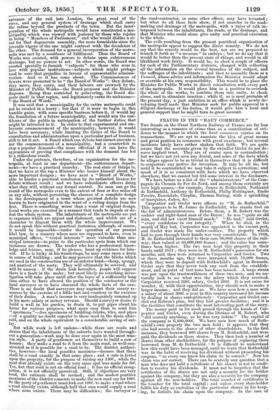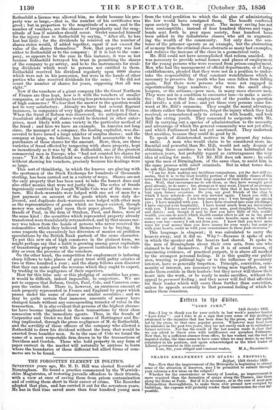FRAUDS IN THE " HAUT COMMERCE."
Tux frauds on the Great Northern Railway of France are far less interesting as a romance of crime than as a contribution of evi- dence to the manner in which the haut commerce carries on its transactions. We are apt to associate the idea of great means and great position in commerce with great exactness ; but several incidents lately have rather shaken that faith. We are quite aware that the accounts given by the swindler Grelet do not de- serve implicit trust. They are of course open to contradiction ; but we have not yet seen any denial, and some of the foots which he alleges appear to be so trivial in themselves that it is difficult to conjecture any motive for invention. It may be all lie, but until it be contradicted we may take it subject to correction • and. much of it is so consistent with facts which we have observed elsewhere, that we cannot but fell some interest in the disclosure.
We have before us a list of the " administrateurs " of the Com- pagnie du Chemin de Fer du Nord, and among them certainly are very high names for example, James de Rothschild, Nathaniel de Rothschild, Anthony de Rothschild, Philip Hottinguer, Emile Pereire, Baxendale, Chaplin, Thomas Baring, with a sprinkling of marquises, dukes, &c.
Carpentier and Grelet were officers to " M. de Rothschild." This appears to be M. James de Rothschild, who stands first on the list of administrateurs. Before them, a M. Robert was the cashier and right-hand man of the Baron ; he was " quite an old man, and did not exert himself much." " He had," said Grelet, " every confidence in our integrity." When he died, in the month of May last, Carpentier was appointed to the vacant post, and Grelet was made the under-cashier. The property which had to pass through their hands was very considerable. In 1848, M. de Rothschild intrusted to their care 60,000 shares of the rail- way, then valued at 50,000,000' francs ; and the value has some- times been higher. The two men kept this property in. their hands until 1851; they were in M. Rothschild's possession for six months, and, then were returned to Carpentier and Grelet. Two or three months ago, they were intrusted. with 70,000 francs, which they were to deposit with Rothschild's agent in Brussels. Grelet says that they never took any cash from the establish- ment, and in point of fact none has been missed. A large strain was put upon the trustworthiness of these two men, and we na- turally look to see what was the salary which they received. Carpentier received 3201. salary, Grelet 2001. It is not cause for wonder, if, with their opportunities, they should seek to make a larger income ; and they did so. We have seen how a man with a salary mg of about 3001. a year in this country increased his income by dealing in shares surreptitiously : Carpentier and Grelet ear- ned out Robson's plan, but they had greater facilities ; and it is the facilities that constitute the most interesting part of the story. The money paid in for stock passed through the hands of Car- pentier and Grelet, even during the lifetime of M. Robert, who "did scarcely anything, as he was very infirm." The capital of the company is 6,400,0001. We have seen how much of Roth- schild's own property the two men held ; it appears that they also had access to the shares of other shareholders. In the first instance, they borrowed 400 shares from M. Rothschild, and were paid the dividends on those shares. They then took a number of shares from other stockholders for the purwse of replacing those borrowed from M. de Rothschild. It is difficult to understand how this could have been managed, until we learn that Rothschild was in the habit of receiving his dividend without presenting hid coupons, " as every one knew his claim to be correct." Now his claim was not correct. There can be scarcely any question that a man who does not hold a certificate of his shares is not in condi- tion to receive his dividends. It must not be forgotten that the certificates of the shares are not only a security for the holder against the company, but they are also a security for the company against all the non-holders. The total number of certificates is the voucher for the total capital ; and unless every shareholder fulfils his duty, as custodian of the particular shares in his keep- ing, he forfeits his claim upon the company. In the case of Rothschild a licence was allowed him, no doubt because his pro- perty was so large,—that is, the number of his certificates was great ; but in proportion to the magnitude of a sum, and to the number of vouchers, are the chances of irregularity and the mag- nitude of loss if mistakes should occur. Grelet consoled himself for the injury done to Rothschild by saying, " After all, he kis lost but little ; for the dividends he received on the number of shares stolen would, if added together, equal if not exceed the value of the shares themselves." Now, that property was lost either to Rothsehild or to the company : if it is lost to the com- pany, as appears to be the case in this instance, it was so lost because Rothschild betrayed his trust in permitting the shares of the company to go astray, and to be the instruments for steal- ing dividends which went to persons not entitled to them. Rothschild received his dividend regularly upon 4000 shares which were not in his possession, but were in the hands of other parties who also received dividends for the same. " He did not count the number of shares for years, supposing that all was right."
Now if the vouchers of a giant company like the Great Northern of France are thus kept, how is it with the vouchers of smaller companies, or of undertakings having less pretensions to be models of high commerce ? We fear that the answer to the question would not be very satisfactory. Already we have had several flagrant instances, in companies of very high standing, and not in France. When the fraud of Robson was discovered, we anticipated that a fraudulent shuffling of shares would be detected in other enter- prises, most likely with some variety in the particular method of the fraud ; and here we have an example. In America not long since, the manager of a company, the leading capitalist, was dis- covered to have issued a large number of surplus shares ; and the company at large, we believe, has been held accountable to the purchasers of those shares for the amount. Here, then, are three varieties of fraud effected by tampering with share property, kept so incautiously as it was by M. de Rothschild, one of the greatest commercial men in Europe, who "had not counted his shares for years." Yet M. de Rothschild was allowed to have his dividend without showing his vouchers, precisely because his dealings were so large. This sort of thimblerig, in which the knaves are playing with the sportsmen of the Stock Exchange for hundreds of thousands sterling, has been carried out in a variety of ways. Shares are not the only property that has been used to take the honest dues and also other monies that were not justly due. The series of frauds ingeniously contrived by Joseph Windle Cole was of the same na- ture. His dock-warrants were lodged with one set of men for a just payment on account of the goods which were duly de- livered, and duplicate dock-warrants were lodged with other men as the representatives of goods which no longer existed, though money was actually paid upon their paper ghosts. The larger frauds of Paul, in the firm of Strahan, Paul, and Bates, were of the same kind : the securities which represented property already transferred were fraudulently retransferred, and by thatmeans mo- ney was taken from the hands of persons who never received the commodities which they believed themselves to be buying. In some respects the excessively lax diversion of monies on profitless sppeecculations by the British Bank partook of the same character. o put this new sin of high commerce in the plainest form, we might perhaps say that a habit is growing among great capitalists of transferring property with the grossest inattention to the vali- dity or even the presence of the vouchers. On the other hand, the competition for employment is inducing sharp fellows to take places of great trust with paltry salaries of two or three hundred a year ; and the sharp fellows soon discover that they can make good the revenue which they ought to expect, by trading in the negligence of their superiors.
How far this false sale or this pledging of securities has gone, it would be difficult, indeed impossible, to conjecture. We are not to suppose that Robson, Grelet, Paul, Cole, and Cameron com- pose the entire list. There is, however, an enormous amount of such property represented in France and. England by paper which passes under the name of shares or similar securities ; and we may be quite certain that immense amounts of money have
i
changed hands without any corresponding transfer of value in the transaction. It is also evident that persons of the highest charac- ter have become implicated in these transactions by their close eonnexion with the immediate agents. Thus, in the frauds of Carpentier and Grelet we find the names of Hottinguer and Ba- ring implicated, through the gross negligence of M. de Rothschild, and the servility of those officers of the company who allowed a Rothschild to draw his dividend without the form that would be exacted from humbler men. So in the case of Cole we found the name of a most respectable firm drawn in by the transactions of Davidson and Gordon. Those who hold property in any form of paper current in the market will naturally be anxious to learn where the boundaries of these different but allied forms of oom- merce are to be found.



























 Previous page
Previous page